Related Research Articles
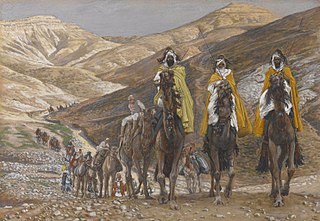
Matthew 2:1 is the first verse of the second chapter of the Gospel of Matthew in the New Testament. The previous verse ends with Jesus being named by his father. This verse marks the clear start of a new narrative, although the use of a quotation from Isaiah 7:14 in Matthew 1:23 is also reflected in the use of four Old Testament quotations in chapter 2.
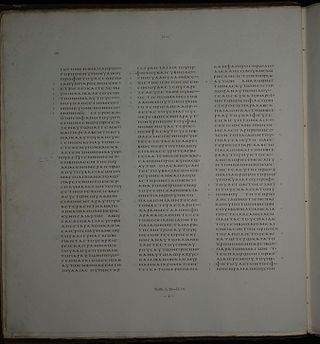
Matthew 2 is the second chapter of the Gospel of Matthew in the New Testament. It describes the events after the birth of Jesus, the visit of the magi and the attempt by King Herod to kill the infant messiah, Joseph and his family's flight into Egypt, and their later return to live in Israel, settling in Nazareth.

Matthew 2:9 is the ninth verse of the second chapter of the Gospel of Matthew in the New Testament. King Herod has dispatched the magi to Bethlehem to find the infant Jesus. In this verse they follow the Star of Bethlehem to find the infant.
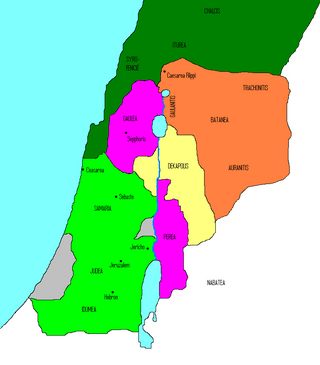
Matthew 2:22 is the twenty-second verse of the second chapter of the Gospel of Matthew in the New Testament. The young Jesus and the Holy Family have just left Egypt after hearing of the death of King Herod.
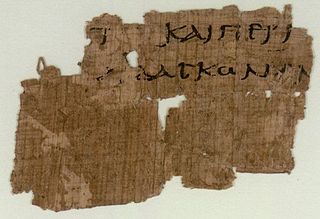
Matthew 4 is the fourth chapter of the Gospel of Matthew in the New Testament of Christian Bible. Many translations of the gospel and biblical commentaries separate the first section of chapter 4 from the remaining sections, which deal with Jesus' first public preaching and the gathering of his first disciples.

Matthew 4:12 is the twelfth verse of the fourth chapter of the Gospel of Matthew in the New Testament. The temptation scene has just ended, and this verse begins the introduction to the discussion of the Ministry of Jesus, which makes up the bulk of the gospel narrative. Jesus' ministry in Galilee extends from this verse as far as Matthew 18:35.

Matthew 4:16 is the sixteenth verse of the fourth chapter of the Gospel of Matthew in the New Testament. In the previous verses Jesus returned to Galilee after hearing of the arrest of John the Baptist and then left Nazareth for Capernaum. This verse contains the second half of a quote from the Book of Isaiah, implying that these movements were preordained by scripture.
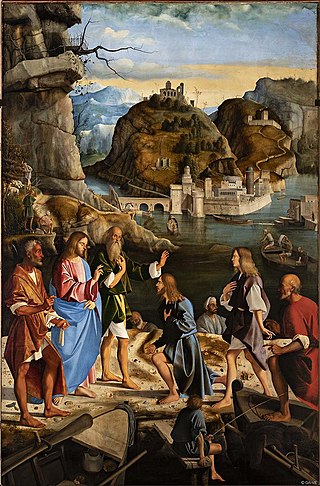
Matthew 4:21 is the twenty-first verse of the fourth chapter of the Gospel of Matthew in the New Testament. Jesus has just recruited Simon Peter and Andrew as disciples. In this verse he encounters the brothers James and John.

Mark 6 is the sixth chapter of the Gospel of Mark in the New Testament of the Christian Bible. In this chapter, Jesus goes to Nazareth and experiences rejection by his own family. He then sends his Apostles in pairs to various cities in the region, where they might also face rejection. Finally, Jesus goes back to the Sea of Galilee and performs some of his most famous miracles, including the feeding of the 5000 and walking on water. This chapter also gives an account of the murder of John the Baptist.

Matthew 14 is the fourteenth chapter in the Gospel of Matthew in the New Testament section of the Christian Bible. It continues the narrative about Jesus' ministry in Galilee and recounts the circumstances leading to the death of John the Baptist.

Luke 9 is the ninth chapter of the Gospel of Luke in the New Testament of the Christian Bible. It records the sending of the twelve disciples, several great miracles performed by Jesus, the story of his transfiguration, Peter's confession and the final departure from Galilee towards Jerusalem. Scottish minister William Robertson Nicoll describes this chapter as unfolding "sundry particulars which together form the closing scenes of the Galilean ministry". The book containing this chapter is anonymous, but early Christian tradition uniformly affirmed that Luke the Evangelist composed this Gospel as well as the Acts of the Apostles.

Luke 23 is the twenty-third chapter of the Gospel of Luke in the New Testament of the Christian Bible. The book containing this chapter is anonymous, but early Christian tradition uniformly affirmed that Luke the Evangelist composed this Gospel as well as the Acts of the Apostles. This chapter records the trial of Jesus Christ before Pontius Pilate, Jesus' meeting with Herod Antipas, and his crucifixion, death and burial.
Matthew 15:21 is a verse in the fifteenth chapter of the Gospel of Matthew in the New Testament.
Matthew 11:1 is the first verse in the eleventh chapter of the Gospel of Matthew in the New Testament.

Matthew 11:7 is the seventh verse in the eleventh chapter of the Gospel of Matthew in the New Testament.
Matthew 14:3 is the third verse in the fourteenth chapter of the Gospel of Matthew in the New Testament.
Matthew 14:1 is the first verse in the fourteenth chapter of the Gospel of Matthew in the New Testament.
Matthew 12:9 is the ninth verse in the twelfth chapter of the Gospel of Matthew in the New Testament.
Matthew 14:12 is the twelfth verse in the fourteenth chapter of the Gospel of Matthew in the New Testament. It refers to the death of John the Baptist and the burial of his body.
Matthew 12:14-16 is a set of verses in the twelfth chapter of the Gospel of Matthew in the New Testament.
References
- ↑ Matthew 14:13: New International Reader's Version and other versions
- ↑ Matthew 14:13: English Standard Version and other versions
- ↑ Jerusalem Bible (1966), Matthew 14:13
- ↑ John MacEvilly, An Exposition of the Gospel of St. John consisting of an analysis of each chapter and of a Commentary critical, exegetical, doctrinal and moral, Dublin, Gill & Son 1879.
- ↑ Meyer, H. A. W., Meyer's NT Commentary on Matthew 15, accessed 12 September 2019
- ↑ Englishman's Concordance, ἀνεχώρησεν, accessed 3 March 2021
- 1 2 3 4 5 "Catena aurea: commentary on the four Gospels, collected out of the works of the Fathers: Volume 6, St. John. Oxford: Parker, 1874. Thomas Aquinas". 1874.
 This article incorporates text from this source, which is in the public domain .
This article incorporates text from this source, which is in the public domain .